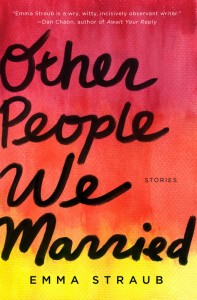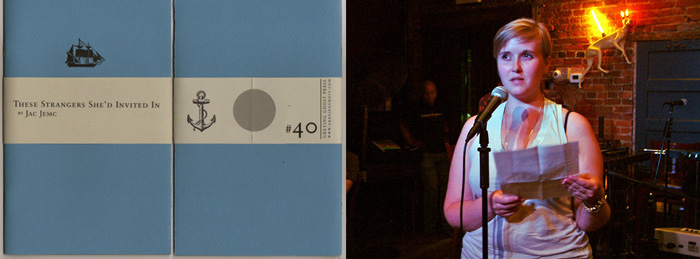 I loved Other People We Married by Emma Straub. I’ll put that out there immediately. Don’t worry, I will get more nuanced than that but first I need to talk about French flaps on books. There Is No Year has French flaps too and that thrilled me. I love paperback books with those flaps on them. It feels sophisticated. The French flap is, by far, the best book innovation I’ve seen in a long time. I want to put French flaps on everything. Other People We Married has French flaps so I was very optimistic when I began reading. I just had to get that off my chest.
I loved Other People We Married by Emma Straub. I’ll put that out there immediately. Don’t worry, I will get more nuanced than that but first I need to talk about French flaps on books. There Is No Year has French flaps too and that thrilled me. I love paperback books with those flaps on them. It feels sophisticated. The French flap is, by far, the best book innovation I’ve seen in a long time. I want to put French flaps on everything. Other People We Married has French flaps so I was very optimistic when I began reading. I just had to get that off my chest.
There are a few things that really elevate Other People We Married above so many of the short story collections I’ve read this year—the visible level of craft in the writing, the intimate attention to detail, and the cleanness of the prose.
When we talk about clean writing and minimilast writing, our natural instinct is to discuss Raymond Carver who is so widely known for his stripped down writing, telling big stories with as little artifice as possible. The stories in Other People We Married did not necessarily evoke Carver for me but there was a really clean, minimal quality to the writing I really enjoyed. The writing in this collection demonstrated a new kind of minimalism, one where the stories are stripped of artifice but still retain some of the detail and texture that can really fill a story and that I sometimes miss when I’m reading the work of someone like Carver.
It is rare that I will love every story in a collection but I did love each of the twelve stories in this collection both individually and also as a whole collection with a distinctive shape. Each story was intimate and engaging and really, really clean. I never found a word or idea out of place, nothing that pulled me from the stories or the people and places borne of Straub’s imagination.
READ MORE >
9 Comments
May 9th, 2011 / 4:32 pm

Annalemma is holding a subscription drive and they need 36 more subscriptions in the next 20 days so they can print Issue Eight. Annalemma is a great magazine that is gorgeously produced–full color throughout, lovely writing and they actually pay writers. You can find more information about the subscription drive, here, and you can actually subscribe here for $25.
I recently learned of the photography of Vivian Maier. It is stunning.
The great blog Ward 6 is shutting down and it is a shame.
Penguin has launched Book Country, a site for writers and fans of genre fiction. Writers can upload work, participate in discussions, and read articles about the publishing industry. It looks pretty interesting.
Things are not looking good for Detroit libraries.
The editor of the NYTBR explains why it is difficult to vet memoirs.
The Atlantic has a special feature on how genius works.
At The Smart Set, Jessa Crispin writes on The Female Body.
A poet inserted poetry into genetic code.
Roundup / 1 Comment
May 5th, 2011 / 3:06 pm

One week ago, a massive tornado tore through Tuscaloosa, Alabama, home of a vibrant writing community associated with the U of A’s esteemed MFA program. Brevity has been gifted with stellar essays from Tuscaloosa students and alums over the years, and their next issue will feature essays from Michael Martone and Wendy Rawlings.
Martone’s essay was written just days after the deadly tornado touched down, killing at least 40 individuals and leaving many, town and gown alike, homeless; Rawlings’ poignant look at her Tuscaloosa neighborhood was written before the storm, and sat in our submissions queue on the evening the tornado turned the city’s neighborhoods inside out.
Brevity has decided to extend the reach of their Tuscaloosa benefit by releasing these two essays one week early: MARTONE ESSAYand RAWLINGS ESSAY. Please spread the word via Facebook, Twitter, e-mail, or whatever method you choose. These beautiful essays deserve as wide a readership as possible, and the editors of Brevity hope that after reading them, you will make a donation to Give Tuscaloosa tornado relief or to the West Alabama Food Bank.
Random / 3 Comments
May 4th, 2011 / 5:45 pm

Jennifer Egan had a pretty great week last week. She won the Pulitzer for her novel The Goon Squad and the news broke that HBO optioned her work for a television series. Then she did an interview with the Wall Street Journal, an interview I read and thoroughly enjoyed. She talks about winning the Pulitzer, fielding the usual questions one might get about how it feels to receive such recognition, how she found out (at a restaurant as she was sitting down), and a little about the work itself. Because she is a woman who writes, and does so prominently, Egan was asked about gender and how male and female writers come off in the press. The exchange looked like this:
Q. Over the past year, there’s been a debate about female and male writers and how they come off in the press. Franzen made clear that “Freedom” was going to be important, while others say that Allegra Goodman was too quiet about “The Cookbook Collector.” Do you think female writers have to start proclaiming, “OK, my book is going to be the book of the century”?
A. Anyone can say anything, that’s easy. My focus is less on the need for women to trumpet their own achievements than to shoot high and achieve a lot. What I want to see is young, ambitious writers. And there are tons of them. Look at “The Tiger’s Wife.” There was that scandal with the Harvard student who was found to have plagiarized. But she had plagiarized very derivative, banal stuff. This is your big first move? These are your models? I’m not saying you should say you’ve never done anything good, but I don’t go around saying I’ve written the book of the century. My advice for young female writers would be to shoot high and not cower.
READ MORE >
Web Hype / 60 Comments
April 26th, 2011 / 1:43 pm

Jarrett Haley, editor of BULL, needs your help:
BULL is now one of five finalists up to win 100K in funding through Dockers’ (Levi’s) “Wear the Pants” Contest. It’s an unprecedented sum for a lit journal, and an unprecedented chance for the literary community to show its strength in numbers.
WE NEED YOUR VOTES—one a day, every day this week. Here’s why you should care about this and take action:
- Your votes are a statement—that reading and writing matter, that journals and small presses are deserving of funding, that stories are important to people and their authors should be compensated.
- The money will go straight to writers. No one’s getting a salary out of this. All funds go towards expanding BULL as a journal and small press. This funding will go into the pocket of artists like you.
- The exposure will bolster the indie lit scene, engaging and informing the public of what’s happening on all these pages, on all these sites. Independent literature is too good to be kept a secret. We want to make more readers in the world, and we’re starting with men.
- This is not a handout, not a Kickstarter campaign, and we’re not asking for a dime. All you have to do is click a button on Facebook. Those clicks alone can create a paying fiction magazine, one with a proven commitment to working closely with writers and building editor/author relationships.
- The opportunity is unprecedented! This is the first time a journal and small press can be founded and well-funded simply by enough people clicking their mouse.
If this is your first time voting, you’ll have to “allow” the voting app and “like” Dockers. There will be boilerplate permission notices, but I assure you it’s legit. Dockers sees only your most basic profile info—what’s already public, what any old stranger can see. They won’t use it for evil and they won’t bombard with you ads. It’s a legitimate contest through a legitimate company.
Dockers is Levi’s, and Levi’s is fucking Levi’s. If ’49ers trusted it during the Gold Rush, so can you today. Do not let skepticism keep you from this opportunity.
A chance like this comes along never. BULL wants to win this with, and for, the literary community. We can’t do it without YOU. Just one click a day and you’ll have done your part. Vote today, and every day, here:

Web Hype / 31 Comments
April 25th, 2011 / 7:27 pm

Jac Jemc‘s novel, My Only Wife, is forthcoming from Dzanc in 2012, and she is also the author of the just released These Strangers She’d Invited In, a beautiful chapbook published by Greying Ghost Press.
I loved These Strangers She’d Invited In. How did this project come about and what’s really going on in this chapbook? I had so many questions.
The project actually started as a class exercise a few years ago. We were supposed to imitate a classmate’s work and there was this filmmaker guy who kept turning in these character names with a bulleted list of traits. My way of ‘copying’ him was to look up a bunch of names of Russian stage actors and make up details about them. Then I turned the details into stories instead of lists. I made a lot more than are in this chapbook, but when I started looking at them as a whole, these were the ones that made sense as a collection.
READ MORE >
Author Spotlight / 15 Comments
April 25th, 2011 / 3:00 pm

If you are a fiction writer, you will inevitably be asked when you plan to release a novel. If you don’t have an answer to that question, or if the answer to that question is, “I have no idea,” or “never,” other writers will look at you strangely. There is an expectation, for fiction writers, that your primary ambition is to produce novel-length work despite a professional education system (the MFA system) that, for better or worse, focuses primarily on the craft of the short story. The short story, while fairly popular in literary magazines, often seems beleaguered within the greater context of the publishing industry. There are lots of notions that the reading public is not interested in the short story and as such, there is less need for a genre for which there is not a significant audience.
Most of the advice about finding an agent implies that if you don’t have a complete novel draft or one well underway, you shouldn’t even bother with seeking representation because short story collections don’t sell. This mantra is repeated over and over although there is ample evidence that it is, indeed, possible to publish a short story collection. Certainly, publishing a story collection is more challenging, particularly with bigger presses, than publishing a novel, but I read collections regularly and don’t foresee that changing anytime soon. I cannot be alone in enjoying short story collections and finding them abundant. Nothing is ever as dire as the rhetoric implies until, of course, you have written nothing but several short story collections and they are sitting, quietly, on your hard drive, gathering virtual dust.
READ MORE >
Craft Notes / 40 Comments
April 20th, 2011 / 4:39 pm









